Deck 9: A Two-Period Model: the Consumptionsavings Decision and Credit Markets
Question
Question
Question
Question
Question
Question
Question
Question
Question
Question
Question
Question
Question
Question
Question
Question
Question
Question
Question
Question
Question
Question
Question
Question
Question
Question
Question
Question
Question
Question
Question
Question
Question
Question
Question
Question
Question
Question
Question
Question
Question
Question
Question
Question
Question
Question
Question
Question
Question
Question
Question
Question
Question
Question
Question
Question
Question
Question
Question
Question
Question
Question
Question
Question
Question
Question
Question
Question
Question

Unlock Deck
Sign up to unlock the cards in this deck!
Unlock Deck
Unlock Deck
1/69
Play
Full screen (f)
Deck 9: A Two-Period Model: the Consumptionsavings Decision and Credit Markets
1
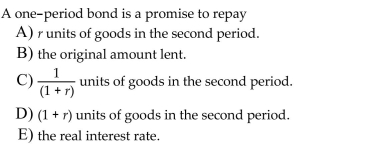
D
2
To ensure a well-defined solution to the consumers' intertemporal choice problems, we must assume that consumers' preferences exhibit the properties that
A)the consumer likes diversity and that more is sometimes preferred to less.
B)they are all identical and that more is always preferred to less.
C)more is sometimes preferred to less and that first-period consumption and second-period consumption are both normal goods.
D)more is sometimes preferred to less and that first-period consumption and second-period consumption are both inferior goods.
E)more is preferred to less and that the consumer prefers diversity.
A)the consumer likes diversity and that more is sometimes preferred to less.
B)they are all identical and that more is always preferred to less.
C)more is sometimes preferred to less and that first-period consumption and second-period consumption are both normal goods.
D)more is sometimes preferred to less and that first-period consumption and second-period consumption are both inferior goods.
E)more is preferred to less and that the consumer prefers diversity.
E
3
According to Friedman, a primary determinant of a consumer's current consumption is
A)rate of expected savings in the second period.
B)temporary income.
C)current levels of GDP.
D)current employment.
E)permanent income.
A)rate of expected savings in the second period.
B)temporary income.
C)current levels of GDP.
D)current employment.
E)permanent income.
E
4
A consumer's budget constraint in the current period is 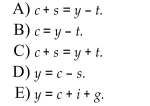


Unlock Deck
Unlock for access to all 69 flashcards in this deck.
Unlock Deck
k this deck
5
A consumer is a lender if
A)the consumer's indifference curves are relatively flat.
B)optimum current consumption is greater than current disposable income.
C)current disposable income is greater than future disposable income.
D)optimum current consumption is less than current disposable income.
E)the consumer's indifference curves are negatively sloped.
A)the consumer's indifference curves are relatively flat.
B)optimum current consumption is greater than current disposable income.
C)current disposable income is greater than future disposable income.
D)optimum current consumption is less than current disposable income.
E)the consumer's indifference curves are negatively sloped.

Unlock Deck
Unlock for access to all 69 flashcards in this deck.
Unlock Deck
k this deck
6
If the consumer is a lender then 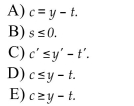


Unlock Deck
Unlock for access to all 69 flashcards in this deck.
Unlock Deck
k this deck
7
The government's current period budget constraint is 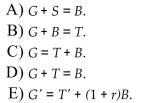


Unlock Deck
Unlock for access to all 69 flashcards in this deck.
Unlock Deck
k this deck
8
A permanent decrease in taxes leads to
A)no changes to consumption.
B)a large increase in current consumption.
C)a small increase in current consumption.
D)a small decrease in current consumption.
E)a large decrease in future consumption.
A)no changes to consumption.
B)a large increase in current consumption.
C)a small increase in current consumption.
D)a small decrease in current consumption.
E)a large decrease in future consumption.

Unlock Deck
Unlock for access to all 69 flashcards in this deck.
Unlock Deck
k this deck
9
In the case where current and future consumption are perfect complements, an increase in the real interest rate
A)involves only income effects.
B)has ambiguous effects depending on whether the substitution or income effects dominate.
C)involves a substitution effect only for lenders.
D)is relevant only for borrowers.
E)involves only substitution effects.
A)involves only income effects.
B)has ambiguous effects depending on whether the substitution or income effects dominate.
C)involves a substitution effect only for lenders.
D)is relevant only for borrowers.
E)involves only substitution effects.

Unlock Deck
Unlock for access to all 69 flashcards in this deck.
Unlock Deck
k this deck
10
The property of diminishing marginal rate of substitution implies that
A)the less current consumption the consumer has, the less future consumption she is willing to give up for one more unit of current consumption.
B)the more current consumption the consumer has, the less future consumption she is willing to give up for one more unit of current consumption.
C)the indifference curves are bowed away from the origin.
D)the indifference curves have a constant slope.
E)the more current consumption the consumer has, the more future consumption she is willing to give up for one more unit of current consumption.
A)the less current consumption the consumer has, the less future consumption she is willing to give up for one more unit of current consumption.
B)the more current consumption the consumer has, the less future consumption she is willing to give up for one more unit of current consumption.
C)the indifference curves are bowed away from the origin.
D)the indifference curves have a constant slope.
E)the more current consumption the consumer has, the more future consumption she is willing to give up for one more unit of current consumption.

Unlock Deck
Unlock for access to all 69 flashcards in this deck.
Unlock Deck
k this deck
11
A permanent increase in income leads to
A)a large increase in current consumption.
B)a small increase in current consumption.
C)a small increase in future consumption.
D)a large decrease in future consumption.
E)a small decrease in future consumption.
A)a large increase in current consumption.
B)a small increase in current consumption.
C)a small increase in future consumption.
D)a large decrease in future consumption.
E)a small decrease in future consumption.

Unlock Deck
Unlock for access to all 69 flashcards in this deck.
Unlock Deck
k this deck
12
The optimal consumption bundle is where
A)the marginal rate of substitution in the current period equals the marginal rate of substitution in the future period.
B)c = y - t - s.
C)MRS = 1 = r.
D)c = s.
E)budget constraint.
A)the marginal rate of substitution in the current period equals the marginal rate of substitution in the future period.
B)c = y - t - s.
C)MRS = 1 = r.
D)c = s.
E)budget constraint.

Unlock Deck
Unlock for access to all 69 flashcards in this deck.
Unlock Deck
k this deck
13
If future income increases, and current income decreases, with lifetime wealth unchanged, a consumer
A)consumes less in the present.
B)reduces current savings.
C)consumes more in the future.
D)consumes more in the present.
E)increases current savings.
A)consumes less in the present.
B)reduces current savings.
C)consumes more in the future.
D)consumes more in the present.
E)increases current savings.

Unlock Deck
Unlock for access to all 69 flashcards in this deck.
Unlock Deck
k this deck
14
A consumer is a borrower if
A)the consumer's indifference curves are relatively steep.
B)the consumer's indifference curves are positively sloped.
C)optimum current consumption is greater than current disposable income.
D)future disposable income is greater than current disposable income.
E)optimum current consumption is less than current disposable income.
A)the consumer's indifference curves are relatively steep.
B)the consumer's indifference curves are positively sloped.
C)optimum current consumption is greater than current disposable income.
D)future disposable income is greater than current disposable income.
E)optimum current consumption is less than current disposable income.

Unlock Deck
Unlock for access to all 69 flashcards in this deck.
Unlock Deck
k this deck
15
The phenomenon that some consumers pay a higher interest rate when they borrow than the interest rate they receive when they lend is best described as an example of
A)a credit market imperfection.
B)irrational behaviour.
C)competitive disequilibrium.
D)a vast banking conspiracy.
E)the burden of public debt.
A)a credit market imperfection.
B)irrational behaviour.
C)competitive disequilibrium.
D)a vast banking conspiracy.
E)the burden of public debt.

Unlock Deck
Unlock for access to all 69 flashcards in this deck.
Unlock Deck
k this deck
16
We assume that the representative consumer's preferences exhibit the properties that
A)current and future consumption are both normal goods and that the consumer likes diversity in his or her consumption bundle.
B)each consumer has one strictly favourite period of time for consumption and that current and future consumption are both normal goods.
C)current and future consumption are both normal goods and that more is always preferred to less.
D)they are convex and that more is always preferred to less.
E)more is always preferred to less and that each consumer has one strictly favourite period of time for consumption.
A)current and future consumption are both normal goods and that the consumer likes diversity in his or her consumption bundle.
B)each consumer has one strictly favourite period of time for consumption and that current and future consumption are both normal goods.
C)current and future consumption are both normal goods and that more is always preferred to less.
D)they are convex and that more is always preferred to less.
E)more is always preferred to less and that each consumer has one strictly favourite period of time for consumption.

Unlock Deck
Unlock for access to all 69 flashcards in this deck.
Unlock Deck
k this deck
17
An important reason why Ricardian equivalence may fail is if
A)real interest rates start to increase.
B)state and local governments also engage in debt finance.
C)some consumers are borrowers, while other consumers are lenders.
D)borrowing and lending is done through intermediaries.
E)government debt incurred today may not be paid off until after some current consumers are deceased.
A)real interest rates start to increase.
B)state and local governments also engage in debt finance.
C)some consumers are borrowers, while other consumers are lenders.
D)borrowing and lending is done through intermediaries.
E)government debt incurred today may not be paid off until after some current consumers are deceased.

Unlock Deck
Unlock for access to all 69 flashcards in this deck.
Unlock Deck
k this deck
18
When different consumers pay different amounts of taxes, Ricardian equivalence may fail because
A)alternative ways of collecting the same tax revenue can have different welfare effects.
B)consumers can become jealous of one another.
C)such differences in taxes create welfare losses to the business community.
D)such differences in taxes create credit market imperfections.
E)higher taxes on more talented people may be politically popular.
A)alternative ways of collecting the same tax revenue can have different welfare effects.
B)consumers can become jealous of one another.
C)such differences in taxes create welfare losses to the business community.
D)such differences in taxes create credit market imperfections.
E)higher taxes on more talented people may be politically popular.

Unlock Deck
Unlock for access to all 69 flashcards in this deck.
Unlock Deck
k this deck
19
An increase in first-period income results in
A)an increase in first-period consumption, an increase in second-period consumption, and a decrease in saving.
B)a decrease in first-period consumption, a decrease in second-period consumption, and an increase in saving.
C)an increase in first-period consumption, an increase in second-period consumption, and an increase in saving.
D)a decrease in first-period consumption, an increase in second-period consumption, and an increase in saving.
E)an increase in first-period consumption, a decrease in second-period consumption, and an increase in saving.
A)an increase in first-period consumption, an increase in second-period consumption, and a decrease in saving.
B)a decrease in first-period consumption, a decrease in second-period consumption, and an increase in saving.
C)an increase in first-period consumption, an increase in second-period consumption, and an increase in saving.
D)a decrease in first-period consumption, an increase in second-period consumption, and an increase in saving.
E)an increase in first-period consumption, a decrease in second-period consumption, and an increase in saving.

Unlock Deck
Unlock for access to all 69 flashcards in this deck.
Unlock Deck
k this deck
20
Distorting taxes can invalidate Ricardian equivalence because
A)the distortions are only faced by the business sector.
B)they are inferior to lump-sum taxes.
C)they confuse consumers about the need for government to repay its debt.
D)they are more popular, politically, than lump-sum taxes.
E)alternative ways of collecting the same tax revenue produce different amounts of lost welfare.
A)the distortions are only faced by the business sector.
B)they are inferior to lump-sum taxes.
C)they confuse consumers about the need for government to repay its debt.
D)they are more popular, politically, than lump-sum taxes.
E)alternative ways of collecting the same tax revenue produce different amounts of lost welfare.

Unlock Deck
Unlock for access to all 69 flashcards in this deck.
Unlock Deck
k this deck
21
The property of diminishing marginal rate of substitution follows from the property that the indifference curves are
A)bowed out from the origin.
B)bowed in toward the origin.
C)downward sloping.
D)negatively sloped.
E)upward sloping.
A)bowed out from the origin.
B)bowed in toward the origin.
C)downward sloping.
D)negatively sloped.
E)upward sloping.

Unlock Deck
Unlock for access to all 69 flashcards in this deck.
Unlock Deck
k this deck
22
In a two-period model, government spending is financed through
A)taxes only.
B)issuing bonds.
C)taxes and transfer payments.
D)taxes and redeeming debt.
E)taxes and issuing debt.
A)taxes only.
B)issuing bonds.
C)taxes and transfer payments.
D)taxes and redeeming debt.
E)taxes and issuing debt.

Unlock Deck
Unlock for access to all 69 flashcards in this deck.
Unlock Deck
k this deck
23
The idea that a permanent increase in income causes a larger increase in consumption than a temporary change in income is called the
A)permanent income hypothesis.
B)Friedman-Lucas theory.
C)Ricardian equivalence theorem.
D)intertemporal substitution effect.
E)steady state theorem.
A)permanent income hypothesis.
B)Friedman-Lucas theory.
C)Ricardian equivalence theorem.
D)intertemporal substitution effect.
E)steady state theorem.

Unlock Deck
Unlock for access to all 69 flashcards in this deck.
Unlock Deck
k this deck
24
In the data, which of the following is most volatile?
A)aggregate income
B)real GDP
C)consumption of services
D)consumption of durables
E)consumption of nondurables
A)aggregate income
B)real GDP
C)consumption of services
D)consumption of durables
E)consumption of nondurables

Unlock Deck
Unlock for access to all 69 flashcards in this deck.
Unlock Deck
k this deck
25
For a competitive equilibrium in a two-period model, which of the following is TRUE?
A)C = Y + T
B)C = Y + S
C)Y = C + I
D)Y = C - T
E)Y = C +
A)C = Y + T
B)C = Y + S
C)Y = C + I
D)Y = C - T
E)Y = C +

Unlock Deck
Unlock for access to all 69 flashcards in this deck.
Unlock Deck
k this deck
26
For a borrower, an increase in the real interest rate
A)definitely reduces current consumption and future consumption.
B)has an uncertain effect on both current and future consumption.
C)has an uncertain effect on current consumption and increases future consumption.
D)definitely reduces current consumption and increases future consumption.
E)reduces current consumption and has an uncertain effect on future consumption.
A)definitely reduces current consumption and future consumption.
B)has an uncertain effect on both current and future consumption.
C)has an uncertain effect on current consumption and increases future consumption.
D)definitely reduces current consumption and increases future consumption.
E)reduces current consumption and has an uncertain effect on future consumption.

Unlock Deck
Unlock for access to all 69 flashcards in this deck.
Unlock Deck
k this deck
27


Unlock Deck
Unlock for access to all 69 flashcards in this deck.
Unlock Deck
k this deck
28
Consumption-savings decisions involve intertemporal choice as this is a decision involving a tradeoff between
A)current and future investment.
B)consumption and saving.
C)consumption per worker and income per worker.
D)consumption and investment.
E)current and future consumption.
A)current and future investment.
B)consumption and saving.
C)consumption per worker and income per worker.
D)consumption and investment.
E)current and future consumption.

Unlock Deck
Unlock for access to all 69 flashcards in this deck.
Unlock Deck
k this deck
29
Consumption smoothing refers to
A)the tendency of consumers to seek an income path over time that is smoother than consumption.
B)balance savings with consumption over time.
C)the tendency of all consumers to choose the same amount of current consumption.
D)the tendency of consumers to seek a consumption path over time that is smoother than income.
E)consumer's concerns about going heavily into debt.
A)the tendency of consumers to seek an income path over time that is smoother than consumption.
B)balance savings with consumption over time.
C)the tendency of all consumers to choose the same amount of current consumption.
D)the tendency of consumers to seek a consumption path over time that is smoother than income.
E)consumer's concerns about going heavily into debt.

Unlock Deck
Unlock for access to all 69 flashcards in this deck.
Unlock Deck
k this deck
30
The marginal rate of substitution of current consumption for future consumption is
A)minus the slope of the difference curve.
B)the slope of the lifetime budget constraint.
C)the slope of the indifference curve.
D)the downward slope of the budget constraint.
E)the endowment point.
A)minus the slope of the difference curve.
B)the slope of the lifetime budget constraint.
C)the slope of the indifference curve.
D)the downward slope of the budget constraint.
E)the endowment point.

Unlock Deck
Unlock for access to all 69 flashcards in this deck.
Unlock Deck
k this deck
31
Aggregate consumption is
A)more variable than savings.
B)more volatile than aggregate income.
C)less variable than aggregate income.
D)positively related to savings.
E)negatively related to real GDP.
A)more variable than savings.
B)more volatile than aggregate income.
C)less variable than aggregate income.
D)positively related to savings.
E)negatively related to real GDP.

Unlock Deck
Unlock for access to all 69 flashcards in this deck.
Unlock Deck
k this deck
32
A one-unit decrease in current income, and a one-unit increase in lifetime wealth
A)both have no effect on the consumer's behaviour.
B)will both have the same effect on savings.
C)imply that future consumption goes down.
D)have the same effect on the consumer's current and future consumption.
E)have different effects on the consumer's current and future consumption.
A)both have no effect on the consumer's behaviour.
B)will both have the same effect on savings.
C)imply that future consumption goes down.
D)have the same effect on the consumer's current and future consumption.
E)have different effects on the consumer's current and future consumption.

Unlock Deck
Unlock for access to all 69 flashcards in this deck.
Unlock Deck
k this deck
33
If people are finite-lived, Ricardian equivalence can fail because
A)lifetime wealth will change for those currently alive.
B)there is intragenerational redistribution.
C)people cannot predict the future.
D)people make bequests.
E)this implies taxes must be distorting.
A)lifetime wealth will change for those currently alive.
B)there is intragenerational redistribution.
C)people cannot predict the future.
D)people make bequests.
E)this implies taxes must be distorting.

Unlock Deck
Unlock for access to all 69 flashcards in this deck.
Unlock Deck
k this deck
34
For a competitive equilibrium in a two-period model, which of the following is TRUE?
A)The financial market clears.
B)There must be an equal number of borrowers and lenders.
C)The present value of government spending must be greater than the present value of taxes.
D)Each consumer picks first- and second-period consumption given the real interest rate.
E)All deficits are financed by issuing debt.
A)The financial market clears.
B)There must be an equal number of borrowers and lenders.
C)The present value of government spending must be greater than the present value of taxes.
D)Each consumer picks first- and second-period consumption given the real interest rate.
E)All deficits are financed by issuing debt.

Unlock Deck
Unlock for access to all 69 flashcards in this deck.
Unlock Deck
k this deck
35
The two primary explanations for the excess volatility of consumption are
A)consumers' limited life spans and credit market imperfections.
B)credit market imperfections and changes in market prices.
C)distorting taxes and consumers' limited life spans.
D)changes in market prices and distorting taxes.
E)changes in market prices and consumer's limited life spans.
A)consumers' limited life spans and credit market imperfections.
B)credit market imperfections and changes in market prices.
C)distorting taxes and consumers' limited life spans.
D)changes in market prices and distorting taxes.
E)changes in market prices and consumer's limited life spans.

Unlock Deck
Unlock for access to all 69 flashcards in this deck.
Unlock Deck
k this deck
36
The endowment point is the consumption bundle in which
A)second-period consumption is equal to zero.
B)consumption is equal to disposable income in each period.
C)consumption is equal to savings in each period.
D)first-period consumption is equal to zero.
E)the consumer finds the most utility.
A)second-period consumption is equal to zero.
B)consumption is equal to disposable income in each period.
C)consumption is equal to savings in each period.
D)first-period consumption is equal to zero.
E)the consumer finds the most utility.

Unlock Deck
Unlock for access to all 69 flashcards in this deck.
Unlock Deck
k this deck
37
An increase in the real interest rate
A)increases savings for lenders, but has an uncertain effect on the savings of borrowers.
B)reduces savings for both borrowers and lenders.
C)increases savings for borrowers, but has an uncertain effect on the savings of lenders.
D)increases savings for both borrowers and lenders.
E)has an uncertain effect on the savings of both borrowers and lenders.
A)increases savings for lenders, but has an uncertain effect on the savings of borrowers.
B)reduces savings for both borrowers and lenders.
C)increases savings for borrowers, but has an uncertain effect on the savings of lenders.
D)increases savings for both borrowers and lenders.
E)has an uncertain effect on the savings of both borrowers and lenders.

Unlock Deck
Unlock for access to all 69 flashcards in this deck.
Unlock Deck
k this deck
38
In the two-period model of the economy
A)there is only one real interest rate.
B)borrowing rates of interest are less than lending rates of interest.
C)borrowing rates of interest are equal to lending rates of interest.
D)borrowing rates of interest are greater than lending rates of interest.
E)there is only one nominal interest rate.
A)there is only one real interest rate.
B)borrowing rates of interest are less than lending rates of interest.
C)borrowing rates of interest are equal to lending rates of interest.
D)borrowing rates of interest are greater than lending rates of interest.
E)there is only one nominal interest rate.

Unlock Deck
Unlock for access to all 69 flashcards in this deck.
Unlock Deck
k this deck
39
A key variable in intertemporal choice is
A)investment.
B)real interest rate.
C)total factor productivity.
D)output per worker.
E)consumption.
A)investment.
B)real interest rate.
C)total factor productivity.
D)output per worker.
E)consumption.

Unlock Deck
Unlock for access to all 69 flashcards in this deck.
Unlock Deck
k this deck
40
For all bonds to be indistinguishable
A)all consumers must never be expected to default on their debts.
B)they must be traded through financial intermediaries.
C)all consumers must be identical.
D)the government must guarantee all bonds.
E)only government can issue bonds.
A)all consumers must never be expected to default on their debts.
B)they must be traded through financial intermediaries.
C)all consumers must be identical.
D)the government must guarantee all bonds.
E)only government can issue bonds.

Unlock Deck
Unlock for access to all 69 flashcards in this deck.
Unlock Deck
k this deck
41
If the government reduces current taxes, government bonds increase, and according to Ricardian equivalence in the credit market
A)the supply curve of private savings shifts to the left to keep the real interest rate constant.
B)the supply curve of private savings shifts right to keep the real interest rate constant.
C)the real interest rate increases.
D)the supply curve of private savings shifts to the right and the real interest rate increases.
E)private savings decreases by an amount equal to the increase in government bonds.
A)the supply curve of private savings shifts to the left to keep the real interest rate constant.
B)the supply curve of private savings shifts right to keep the real interest rate constant.
C)the real interest rate increases.
D)the supply curve of private savings shifts to the right and the real interest rate increases.
E)private savings decreases by an amount equal to the increase in government bonds.

Unlock Deck
Unlock for access to all 69 flashcards in this deck.
Unlock Deck
k this deck
42


Unlock Deck
Unlock for access to all 69 flashcards in this deck.
Unlock Deck
k this deck
43
The endowment point is the consumption bundle in which
A)households maximize utility.
B)permanent income is maximized.
C)households are indifferent to interest rate changes.
D)current consumption is equal to future consumption.
E)savings are zero.
A)households maximize utility.
B)permanent income is maximized.
C)households are indifferent to interest rate changes.
D)current consumption is equal to future consumption.
E)savings are zero.

Unlock Deck
Unlock for access to all 69 flashcards in this deck.
Unlock Deck
k this deck
44
Bonds are assumed to trade directly
A)through financial intermediaries.
B)through the Bank of Canada.
C)in the stock market.
D)through the federal government.
E)in the credit market.
A)through financial intermediaries.
B)through the Bank of Canada.
C)in the stock market.
D)through the federal government.
E)in the credit market.

Unlock Deck
Unlock for access to all 69 flashcards in this deck.
Unlock Deck
k this deck
45
The substitution effect of a change in the real interest rate is an example of
A)an intertemporal substitution effect.
B)a permanent substitution effect.
C)a positive substitution effect.
D)a temporary substitution effect.
E)a negative substitution effect.
A)an intertemporal substitution effect.
B)a permanent substitution effect.
C)a positive substitution effect.
D)a temporary substitution effect.
E)a negative substitution effect.

Unlock Deck
Unlock for access to all 69 flashcards in this deck.
Unlock Deck
k this deck
46
An increase in the real interest rate is an example of a
A)substitution effect and a positive income effect.
B)substitution effect and a negative income effect.
C)positive substitution effect and a negative income effect.
D)pure substitution effect.
E)substitution effect and an income effect whose sign depends on whether the consumer is initially a borrower or a lender.
A)substitution effect and a positive income effect.
B)substitution effect and a negative income effect.
C)positive substitution effect and a negative income effect.
D)pure substitution effect.
E)substitution effect and an income effect whose sign depends on whether the consumer is initially a borrower or a lender.

Unlock Deck
Unlock for access to all 69 flashcards in this deck.
Unlock Deck
k this deck
47
The Ricardian equivalence theorem implies that
A)the timing of taxes collected by the government is neutral.
B)an increase in government spending has no effect on the economy, as long as there is an equal change in taxes.
C)government debt policy must be handled correctly for the economy to prosper.
D)the present value of government spending must be equal to the present value of taxes.
E)the amounts of government spending are neutral.
A)the timing of taxes collected by the government is neutral.
B)an increase in government spending has no effect on the economy, as long as there is an equal change in taxes.
C)government debt policy must be handled correctly for the economy to prosper.
D)the present value of government spending must be equal to the present value of taxes.
E)the amounts of government spending are neutral.

Unlock Deck
Unlock for access to all 69 flashcards in this deck.
Unlock Deck
k this deck
48
A good proxy for the flow of consumption services would be
A)consumption of services and consumption of durables.
B)consumption of durables and consumption of nondurables.
C)aggregate consumption.
D)consumption of nondurables and consumption of services.
E)consumption of durables and services.
A)consumption of services and consumption of durables.
B)consumption of durables and consumption of nondurables.
C)aggregate consumption.
D)consumption of nondurables and consumption of services.
E)consumption of durables and services.

Unlock Deck
Unlock for access to all 69 flashcards in this deck.
Unlock Deck
k this deck
49
Ricardian equivalence suggests that the government must pay off its debt by
A)reducing government spending in the future.
B)increasing the real interest rate.
C)transferring surpluses to the debt.
D)reducing private savings in the future.
E)increasing taxes in the future.
A)reducing government spending in the future.
B)increasing the real interest rate.
C)transferring surpluses to the debt.
D)reducing private savings in the future.
E)increasing taxes in the future.

Unlock Deck
Unlock for access to all 69 flashcards in this deck.
Unlock Deck
k this deck
50
The consumer's lifetime budget constraint states that
A)the present value of lifetime consumption must be equal to the present value of lifetime disposable income.
B)the present value of lifetime consumption must be equal to the present value of lifetime gross income.
C)the present value of lifetime consumption plus the present value of lifetime taxes to be paid must be equal to the present value of lifetime income.
D)the present value of lifetime taxes to be paid by the consumer must be equal to the present value of government spending.
E)he present value of lifetime consumption must be equal to the present value of savings.
A)the present value of lifetime consumption must be equal to the present value of lifetime disposable income.
B)the present value of lifetime consumption must be equal to the present value of lifetime gross income.
C)the present value of lifetime consumption plus the present value of lifetime taxes to be paid must be equal to the present value of lifetime income.
D)the present value of lifetime taxes to be paid by the consumer must be equal to the present value of government spending.
E)he present value of lifetime consumption must be equal to the present value of savings.

Unlock Deck
Unlock for access to all 69 flashcards in this deck.
Unlock Deck
k this deck
51
A key channel for interest rate effects on real activity will be through
A)consumption and savings.
B)aggregate investment.
C)permanent income.
D)temporary income.
E)aggregate consumption.
A)consumption and savings.
B)aggregate investment.
C)permanent income.
D)temporary income.
E)aggregate consumption.

Unlock Deck
Unlock for access to all 69 flashcards in this deck.
Unlock Deck
k this deck
52
The Ricardian Equivalence Theorem implies that a change in the timing of taxes
A)has a positive effect on both consumption and the real interest rate.
B)affects consumption negatively and the real interest rate positively.
C)has a negative effect on both consumption and the real interest rate.
D)affects consumption positively and the real interest rate negatively.
E)has no effect on consumption or the real interest rate.
A)has a positive effect on both consumption and the real interest rate.
B)affects consumption negatively and the real interest rate positively.
C)has a negative effect on both consumption and the real interest rate.
D)affects consumption positively and the real interest rate negatively.
E)has no effect on consumption or the real interest rate.

Unlock Deck
Unlock for access to all 69 flashcards in this deck.
Unlock Deck
k this deck
53
Supposing Ricardian equivalence holds, an increase in current taxes
A)increases government spending.
B)reduces future aggregate consumption.
C)increases current aggregate consumption.
D)reduces current saving.
E)reduces current aggregate consumption.
A)increases government spending.
B)reduces future aggregate consumption.
C)increases current aggregate consumption.
D)reduces current saving.
E)reduces current aggregate consumption.

Unlock Deck
Unlock for access to all 69 flashcards in this deck.
Unlock Deck
k this deck
54
In our two-period model, the government must pay off all debt, in reality
A)this is approximately correct.
B)governments rarely pay off all of their debt.
C)only developing countries can perpetually run deficits.
D)governments take longer than two-periods to pay off debt, but almost always do.
E)only countries in the European Union are unlikely to ever pay off their debt.
A)this is approximately correct.
B)governments rarely pay off all of their debt.
C)only developing countries can perpetually run deficits.
D)governments take longer than two-periods to pay off debt, but almost always do.
E)only countries in the European Union are unlikely to ever pay off their debt.

Unlock Deck
Unlock for access to all 69 flashcards in this deck.
Unlock Deck
k this deck
55
For a lender, an increase in the real interest rate
A)reduces current consumption and has an uncertain effect on future consumption.
B)has an uncertain effect on both current and future consumption.
C)definitely reduces current consumption and increases future consumption.
D)definitely reduces current consumption and future consumption.
E)has an uncertain effect on current consumption and increases future consumption.
A)reduces current consumption and has an uncertain effect on future consumption.
B)has an uncertain effect on both current and future consumption.
C)definitely reduces current consumption and increases future consumption.
D)definitely reduces current consumption and future consumption.
E)has an uncertain effect on current consumption and increases future consumption.

Unlock Deck
Unlock for access to all 69 flashcards in this deck.
Unlock Deck
k this deck
56
Intertemporal decisions involve economic decisions
A)that ignore concerns about the future.
B)made within a given period of time.
C)made in between two periods of time.
D)that are made only once.
E)involving tradeoffs across periods of time.
A)that ignore concerns about the future.
B)made within a given period of time.
C)made in between two periods of time.
D)that are made only once.
E)involving tradeoffs across periods of time.

Unlock Deck
Unlock for access to all 69 flashcards in this deck.
Unlock Deck
k this deck
57
When there are credit market imperfections, an increase in government debt may be advantageous because it
A)borrows at higher interest rates than consumers.
B)discourages credit-constrained consumers from borrowing too much.
C)encourages more private saving.
D)eliminates the problems that cause credit market imperfections.
E)increases the welfare of credit-constrained consumers.
A)borrows at higher interest rates than consumers.
B)discourages credit-constrained consumers from borrowing too much.
C)encourages more private saving.
D)eliminates the problems that cause credit market imperfections.
E)increases the welfare of credit-constrained consumers.

Unlock Deck
Unlock for access to all 69 flashcards in this deck.
Unlock Deck
k this deck
58
An increase in second-period income results in
A)a decrease in first-period consumption, an increase in second-period consumption, and an increase in saving.
B)an increase in first-period consumption, an increase in second-period consumption, and an increase in saving.
C)a decrease in first-period consumption, a decrease in second-period consumption, and an increase in saving.
D)an increase in first-period consumption, a decrease in second-period consumption, and an increase in saving.
E)an increase in first-period consumption, an increase in second-period consumption, and a decrease in saving.
A)a decrease in first-period consumption, an increase in second-period consumption, and an increase in saving.
B)an increase in first-period consumption, an increase in second-period consumption, and an increase in saving.
C)a decrease in first-period consumption, a decrease in second-period consumption, and an increase in saving.
D)an increase in first-period consumption, a decrease in second-period consumption, and an increase in saving.
E)an increase in first-period consumption, an increase in second-period consumption, and a decrease in saving.

Unlock Deck
Unlock for access to all 69 flashcards in this deck.
Unlock Deck
k this deck
59
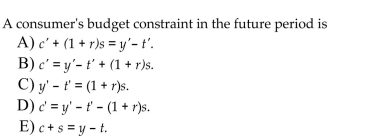

Unlock Deck
Unlock for access to all 69 flashcards in this deck.
Unlock Deck
k this deck
60
The simplest device to analyze dynamic decisions is a
A)two-period model.
B)one-period model.
C)model that includes only the number of years of a typical consumer's lifetime.
D)dynamic time model.
E)continuous time model.
A)two-period model.
B)one-period model.
C)model that includes only the number of years of a typical consumer's lifetime.
D)dynamic time model.
E)continuous time model.

Unlock Deck
Unlock for access to all 69 flashcards in this deck.
Unlock Deck
k this deck
61
Ricardian equivalence is often attributed to David Ricardo and more attributed to
A)Adam Smith.
B)Robert Barro.
C)Gerald O'Driscoll.
D)Robert Lucas.
E)Milton Friedman.
A)Adam Smith.
B)Robert Barro.
C)Gerald O'Driscoll.
D)Robert Lucas.
E)Milton Friedman.

Unlock Deck
Unlock for access to all 69 flashcards in this deck.
Unlock Deck
k this deck
62
The government's present value budget constraint states that
A)the government may run deficits each and every year, as long as the deficits are sufficiently small.
B)the present value of government spending must be equal to the present value of consumers' disposable incomes.
C)governments can increase spending as long as deficits are financed by issuing debt.
D)the present value of government spending must be equal to the present value of taxes.
E)taxes must equal government spending in each period.
A)the government may run deficits each and every year, as long as the deficits are sufficiently small.
B)the present value of government spending must be equal to the present value of consumers' disposable incomes.
C)governments can increase spending as long as deficits are financed by issuing debt.
D)the present value of government spending must be equal to the present value of taxes.
E)taxes must equal government spending in each period.

Unlock Deck
Unlock for access to all 69 flashcards in this deck.
Unlock Deck
k this deck
63
If government spending is held constant and Ricardian equivalence holds
A)an increase in the government budget deficit is always matched by a reduction in private savings.
B)an increase in government savings is always matched by an equal increase in private savings.
C)an increase in government savings is always matched by an increase in the government budget deficit.
D)an increase in government savings is always matched by an increase in the real interest rate.
E)an increase in government savings is always matched by an equal reduction in private savings.
A)an increase in the government budget deficit is always matched by a reduction in private savings.
B)an increase in government savings is always matched by an equal increase in private savings.
C)an increase in government savings is always matched by an increase in the government budget deficit.
D)an increase in government savings is always matched by an increase in the real interest rate.
E)an increase in government savings is always matched by an equal reduction in private savings.

Unlock Deck
Unlock for access to all 69 flashcards in this deck.
Unlock Deck
k this deck
64
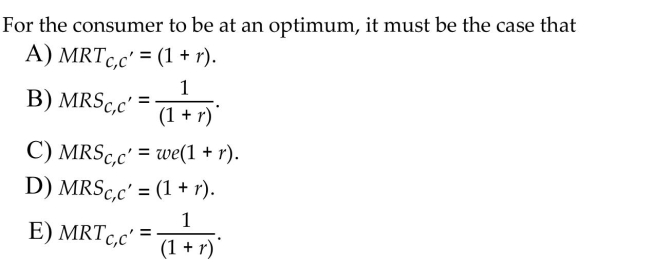

Unlock Deck
Unlock for access to all 69 flashcards in this deck.
Unlock Deck
k this deck
65
What is consumption smoothing and how is it affected with an increase in temporary and permanent income?

Unlock Deck
Unlock for access to all 69 flashcards in this deck.
Unlock Deck
k this deck
66


Unlock Deck
Unlock for access to all 69 flashcards in this deck.
Unlock Deck
k this deck
67
If consumers expect a tax cut to be temporary
A)the increase in consumption will be much larger than for a permanent tax cut.
B)the increase in consumption will be much smaller than for a permanent tax cut.
C)the decrease in consumption will be much smaller than for a permanent tax cut.
D)consumption remains unchanged.
E)the overall effects are much larger than for a permanent tax cut.
A)the increase in consumption will be much larger than for a permanent tax cut.
B)the increase in consumption will be much smaller than for a permanent tax cut.
C)the decrease in consumption will be much smaller than for a permanent tax cut.
D)consumption remains unchanged.
E)the overall effects are much larger than for a permanent tax cut.

Unlock Deck
Unlock for access to all 69 flashcards in this deck.
Unlock Deck
k this deck
68
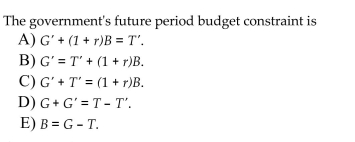

Unlock Deck
Unlock for access to all 69 flashcards in this deck.
Unlock Deck
k this deck
69
The private supply of credit is an increasing function of the real interest rate if
A)the income effects outweighs the substitution effects when added across all consumers.
B)the income effect outweighs the substitution effects for borrowers.
C)the substitution effects outweighs the income effects when added across all consumers.
D)the substitution and income effects cancel each other.
E)consumers are rational.
A)the income effects outweighs the substitution effects when added across all consumers.
B)the income effect outweighs the substitution effects for borrowers.
C)the substitution effects outweighs the income effects when added across all consumers.
D)the substitution and income effects cancel each other.
E)consumers are rational.

Unlock Deck
Unlock for access to all 69 flashcards in this deck.
Unlock Deck
k this deck


